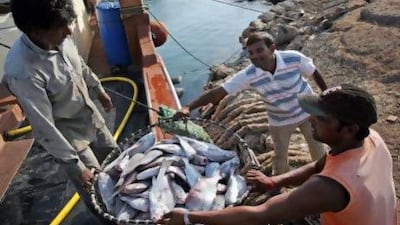Fish stocks off the east coast decreased by more than two-thirds in just nine years.
Stocks were estimated to be 529 kilograms a square kilometre in 2011 compared with 1,735kg per square kilometre in 2002, figures from the Ministry of Environment and Water reveal.
The data was released to Al Ittihad, the Arabic-language sister paper of The National, as the ministry explained why it was temporarily suspending the issuing of fishing licences nationwide.
There are 6,700 fishing boats already licensed by the ministry.
No one at the ministry was available yesterday to explain how the numbers were obtained.
But the data corroborates the findings of scientists at the Environment Agency Abu Dhabi (Ead).
"These recent findings reinforce and support a whole suite of fish-assessment activities that have been going on in Abu Dhabi and the UAE," said Edwin Grandcourt, manager of the agency's marine assessment and conservation section.
"It is blindingly clear that the decline in fish stocks has been associated with the exponential increase of the human population."
With a rapid rise in consumer demand for fresh fish, current catch levels are greater than the UAE's coastlines can sustainably provide.
If the trend continues unabated, the future appears grim for both the UAE's marine environment and the livelihoods of its fishermen.
"The expectation is that the fishing industry will not be viable," Mr Grandcourt said.
Limits on the number of fishing licences have been in place in Abu Dhabi since 2001.
The agency has implemented a host of other measures including limiting the number of traditional fishing cages, known as gargoor, to 125 a vessel, Mr Grandcourt said.
It is compulsory to equip gargoor with escape panels through which juvenile fish can escape.
Seasonal bans on the fishing of certain species during critical stages of their life-cycle have been introduced, as have marine-protected areas with no-take zones.
"Ead has been monitoring the status of several of the most important demersal species and there have been small increases or evidence that shows stocks have been rebuilding," he said. "The rate of increase in stock size is still going to fall short of the environmental vision 2030 target of achieving sustainable exploitation. This suggests more restrictive fishing regulations will be required."
The agency has also started a socio-economic survey of fisheries in Abu Dhabi. When finished next March the agency will gain "a better idea of how regulations are affecting people's lives and their jobs", said Mr Grandcourt.

